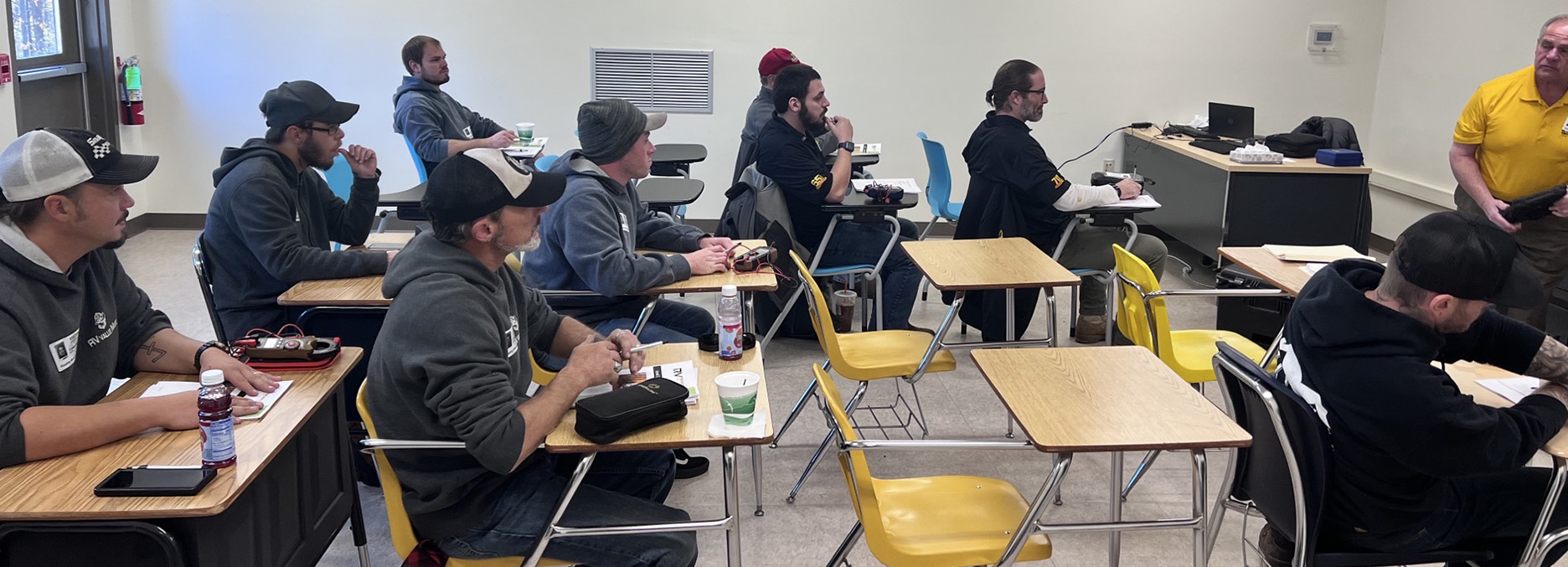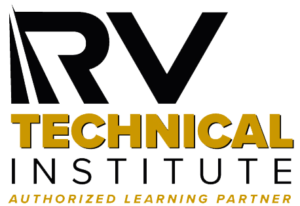
RV Tech Certification
As the need for highly trained RV technicians continues to grow, PRVCA is working to provide our members with the training they need to become certified RV technicians. The association is an authorized training partner with the RV Technical Institute (RVTI). This industry-wide certification program was developed by top industry experts and is designed to include both classroom and hands-on training. Technicians certified through the RVTI program are armed with the skills and knowledge sought after by dealers, manufacturers and repair shops. As an authorized learning partner, PRVCA offers a discount rate to members.
Note: You may be required to register an account with RVTI to take the course.
Start Your Career as an RV Technician
 The RV technician career path is divided into four levels of proficiency. A technician will be awarded a Level 1, 2, 3 or Level 4 Master Technician credential based on successfully demonstrating the required knowledge and skills at each level. This hands-on, competency-based program is divided into four levels of training and proficiency covering theory and application, specialties training and troubleshooting. Each training program builds upon the foundation of the previous one, so you can gain confidence in the skills needed to become an in-demand RV service technician. The RV technician career path is divided into four levels of proficiency. A technician will be awarded a Level 1, 2, 3 or Level 4 Master Technician credential based on successfully demonstrating the required knowledge and skills at each level. This hands-on, competency-based program is divided into four levels of training and proficiency covering theory and application, specialties training and troubleshooting. Each training program builds upon the foundation of the previous one, so you can gain confidence in the skills needed to become an in-demand RV service technician.
| Level 1 - Inspection Technician |
Technician demonstrates proven skill set to prepare an RV for customer delivery by verifying the operation of all components.
- Must successfully pass Level 1 written and skill-based (practical) exams.
- Good for life with no re-certification or continuing education requirements.
- A yearly information and employment verification check-in are needed to stay active.
|
| Level 2 - Diagnostic and Repair Technician |
A technician with theoretical knowledge of all the systems and components within an RV and a proven skill set to be able to perform basic diagnostics, troubleshooting, and repairs on those systems and components.
- Must successfully pass Level 1 and 2 written and skill-based (practical) exams.
- Good for 5 years. Over this period, the technician must acquire 24 hours of continuing education credits (CEUs) of approved hands-on or online trainings.
- A yearly information and employment verification check-in are needed to stay active.
|
| Level 3 - Specialty Technician |
A technician that has completed supplier training on specific types of components and increased their skill set to be able to perform advanced diagnostics, troubleshooting, and repairs on those systems and components.
- Electrical Specialist: Demonstrates skill and expertise in converter, inverter, transfer switches, management systems, batteries including lithium-ion, surge protection and solar
- Chassis Specialist: Demonstrates skill and expertise in stabilization, leveling, electric steps, braking system (hydraulic and electric) and vehicle weights
- Electronics Specialist: Demonstrates skill and expertise in satellite systems, multiplexing and control area networks (CAN)
- Appliance Specialist: Demonstrates skill and expertise in furnaces, air conditioning, refrigerators, water heaters (including traditional, instantaneous and hydronic)
- Slideout Specialist: Demonstrates skill and expertise in cable slide-outs, above floor slide-outs, through frame slide-outs (including screw-type, rack-n-pinion, hydraulic and flush mounted)
- Must successfully pass Level 1 and 2 written and skill-based (practical) exams as well as attend and pass 24-hours of approved hands-on vendor training within five years covering the minimum topics listed for each specialty.
- Good for 5 years. Over this period, the technician must acquire 24 hours of continuing education credits (CEUs) of approved hands-on or online trainings. 8 of the 24 hours of CEUs must be directly related to the specialty held.
- A yearly information and employment verification check-in are needed to stay active.
|
| Level 4 - Master Technician |
The Master Technician has completed all five designated specialties through vendor trainings and is proficient in troubleshooting and repair of all the major systems and components within an RV.
- Good for 5 years. Over this period, the technician must acquire 24 hours of continuing education credits (CEUs) of approved hands-on or online trainings. These trainings can include participation at the RV Technical Institute or other industry-approved activities such as curriculum development, train-the-trainer programs and leadership training.
- A yearly information and employment verification check-in are needed to stay active.
Program Areas
- Propane Systems
- Electrical Systems
- Water Systems
- Appliances
- Generators
- Chassis
- RV Bodies
|
|


 The RV technician career path is divided into four levels of proficiency. A technician will be awarded a Level 1, 2, 3 or Level 4 Master Technician credential based on successfully demonstrating the required knowledge and skills at each level. This hands-on, competency-based program is divided into four levels of training and proficiency covering theory and application, specialties training and troubleshooting. Each training program builds upon the foundation of the previous one, so you can gain confidence in the skills needed to become an in-demand RV service technician.
The RV technician career path is divided into four levels of proficiency. A technician will be awarded a Level 1, 2, 3 or Level 4 Master Technician credential based on successfully demonstrating the required knowledge and skills at each level. This hands-on, competency-based program is divided into four levels of training and proficiency covering theory and application, specialties training and troubleshooting. Each training program builds upon the foundation of the previous one, so you can gain confidence in the skills needed to become an in-demand RV service technician.